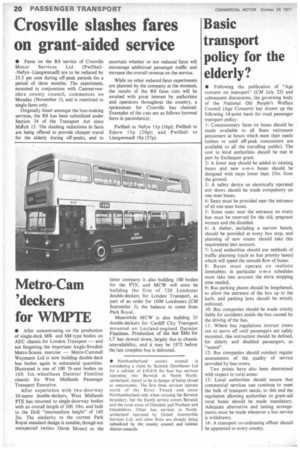Basic transport policy for the elderly?
Page 22

If you've noticed an error in this article please click here to report it so we can fix it.
• Following the publication of "Age concern on transport" (CM July 23) and subsequent discussions, the governing body of the National Old People's Welfare Council (Age Concern) has drawn up the following 14-point basis for road passenger transport policy: l: Concessionary fares on buses should be made available to all State retirement pensioners at hours which meet their needs (unless or until off-peak concessions are available to all the travelling public). The cost to local authorities should be met in part by Exchequer grant.
2: A lower step should be added to existing buses and new o-m-o buses should be designed with steps lower than 15in. from the ground.
3: A safety device on electrically operated exit doors should be made compulsory on one-mad buses.
4: Seats must be provided near the entrance of all one-man buses.
5: Some seats near the entrance on every bus must be reserved for the old, pregnant women and the disabled.
6: A shelter, including a narrow bench, should be provided at every bus stop, and planning of new routes should take this requirement into account.
7: Local authorities should use methods of traffic planning (Mich as bus priority lanes) which will speed the smooth flow of buses.
8: Buses must operate on realistic timetables; in particular o-m-o schedules must take into account the extra stopping time needed.
9: Bus parking places should be lengthened, to allow the entrance of the bus up to the kerb, and parking laws should be strictly enforced.
10: Bus companies should be made strictly liable for accidents inside the bus caused by the driving of the bus.
11: Where bus regulations instruct crews not to move off until passengers are safely mounted, this instruction should be defined, for elderly and disabled passengers, as "seated".
12: Bus companies should conduct regular assessments of the quality of service provided by bus crews.
Two points have also been determined with respect to rural areas:
13: Local authorities should ensure that commercial services can continue to meet the bulk of transport needs; to this end the regulation allowing authorities to grant-aid rural buses should be made mandatory. Adequate alternative and lasting arrangements must be made whenever a bus service is withdrawn.
14: A transport co-ordinating officer should be appointed to every county.












































































































































